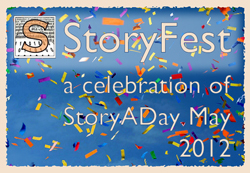This is for everyone – whether you wrote or you didn’t. If you wrote in a previous year; if you wanted to write but couldn’t make it; if you wrote one story; if you simply read and enjoyed someone else’s.
This is our chance to celebrate, and boost both the short story and our friends in StoryADay.
StoryFest 2012
June 8-10
storyaday.org
How To Celebrate StoryFest
- Come to the site June 8-10, follow a link to a story, read it and comment on it.
- If you wrote even one story in this (or any previous) StoryADay, submit one to be featured on the site’s front page June 8-10.
- Nominate someone else’s story to be featured.
- Spread the word: from Jun 1-10, tell everyone you know on every social network (especially the ones with readers in them) about StoryFest. Tell them to come to the site June 8-10 to read new and exciting work by up-and-coming future stars of the literary world!
- Post the graphic on your blog, your Facebook timeline, tattoo it on your leg, whatever! (Get your graphics here)
What is StoryFest?
StoryFest is a weekend when the stories take over StoryADay.org.
On Jun 8, the front page of StoryADay.org will change to one dedicated to you and your stories. It will be full of links to your stories, online, until June 10.
It’s our end-of-year party, our recital, our chance to share our work with readers.
How To Submit/Nominate A Story
Simple.
Be ready to supply your storyaday username, your real name or psuedonym, a link to the story you’re nominating, its title and a summary, a link to a story by someone else (optional but karmically recommended).
Deadline: Tuesday, June 5.
This gives you a few days to pick your story and possibly polish it a bit. If you can get it to me before the deadline I’ll love you forever, though, as it’s going to take me a while to organize all the submissions.
StoryFest FAQ
Does my story have to be online?
Yes. We want to create a reader fanbase for you. Stories must be posted somewhere online, in full.
Is it OK if my story is on my personal blog (or other site).
Absolutely. Just supply the link.
Will it be considered published?
Your story is not being published by StoryADay, but you should be aware that some editors still consider a story that has been posted online, as having been previously published. If you think this is your last good story ever, by all means guard it with your life. Otherwise, I wouldn’t spend too much time worrying about this.
Does It Have To Be A Story I Wrote During StoryADay?
Yes. I’ll have to trust you on this. But it can be a story you wrote in a previous year.
Why Do I Have To Select A Genre Label?
Try not to agonize over this. I know most fiction is really cross-genre. It’s just short-hand for readers. I know I’m more likely to plump for a Speculative/Sci-Fi story or a mystery before I will read a fantasy story. As a reader, you don’t want to scroll through a long list of stories with no clues as to which you might prefer. Genre labels simply help readers make a quick decision, rather than being paralysed or overwhelmed and not clicking on anything. Just think like a reader, grit your teeth and pick a genre.
Can I Submit Erotica/Horror/TheWierdStuff?
Um, okay. But I’d appreciate it if you’d label it as such, so as not to scare the grownups.
Can I Revise My Story?
Absolutely. Polish it up, shine its little shoes, put a bow in its hair and send it into the world looking its best. But don’t take too long! And remember, you’re unlikely to ever be 100% satisfied. Polish it a bit, then let it go.



